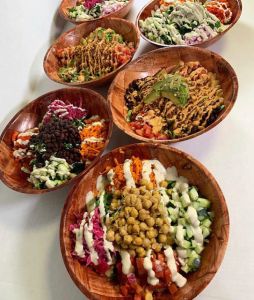“I went vegetarian when I was around 12 for no other reason than the fact that I just didn’t like the taste of meat products and all the things that went into them. I went vegan around 16 and have been since.”
Julie White, sophomore fine art and textiles major at Temple University, decided to go vegetarian because she preferred foods that did not contain meat. She later went vegan because she noticed the health benefits that come with it, along with the idea that it helps stop animal cruelty and the “support of slaughter industries.”
A vegetarian diet is plant-based but can include dairy and eggs. A vegan diet is a plant-based diet and excludes all foods and products that come from an animal. Another option is called plant-forward because it is a plant-based diet but includes some meat, but the main focus is plant-based food.
“Some health benefits are that my skin has cleared up a lot, I don’t get sick as often because I consume less dairy, I have more energy and don’t get as severe a tired and heavy feeling after eating bigger meals,” White said. “It also goes hand in hand with different diets or exercise routines to keep me on track.”
In an article by Healthline, plant-based diets can “lower the risk of developing a heart disease, reduce the risk of cancer, prevent Alzheimer’s disease and reduce the chances of developing diabetes.”
Also, as many people follow a plant-based diet, it is important to include a daily workout, but keep it short and intense, as recommended by VegNews.
A few examples of these workouts are:
- “Warm up for 3–5 minutes, exercise as hard and fast as you can for 30–60 seconds, recover but keep moving at a slower pace or reduced resistance for 90 seconds, and repeat 10 more times.”
- “To gain muscle and strength, lift heavy weights (6–12 reps per set), push your body to the max every set to make each one count, and take a minute or two to recover between sets.”
The importance of short, intense workouts is to “gain muscle, adapt to your body’s protein needs, overcome low creatine levels, enhance insulin sensitivity and achieve results faster.”
Being vegetarian was not a hard transition for her because she already did not consume too much animal products and only “liked chicken and turkey.”
Since becoming vegan her favorite meals are “veggie burgers or pasta with zucchini and a bunch of vegetables.”
When going to buy groceries to make vegan meals, she learned that some places are expensive and overcharge but over time you get in a pattern of knowing what’s vegan and what’s not in order to make it more affordable.
Also, there are many restaurants in the Philadelphia area that offer vegetarian and vegan options, as well as restaurants made solely for those options, such as V Street, Gangster Vegan, Hip City Veg, Dottie’s Donuts and Blackbird Pizzeria.

Photo via Instagram.

Photo via Instagram.
She was also able to recognize the right protein and dairy sources for her diet noting that “There’s actually a lot more protein sources for vegans, such as in avocados, beans, hummus, lentils, etc. and almond milk isn’t that expensive and it lasts for months so you can buy it in bulk for cheaper”
Being the only one vegan in her family, she does not plan on raising her children to be vegan, but would “definitely incorporate vegan meals and educate them on it so they had the option to choose if they wanted to follow that kind of lifestyle and diet.”
In an article by EverydayHealth, “3.3 percent of the U.S. population was vegetarian in 2016.” This number includes many celebrities who have an influence on teenagers and adults, including “Ariana Grande, Miley Cyrus, Kristen Bell, Liam Hemsworth, Lea Michele, Carrie Underwood, and many more,” who explained that they went vegan or vegetarian for health reasons and animal cruelty.
Although plant-based diets are a benefit for the human body, it also helps the environment.
Healthline mentions that plant-based diets can “reduce greenhouse gas emissions, water consumption and land used for factory farming, which are all factors in global warming and environmental degradation.”


